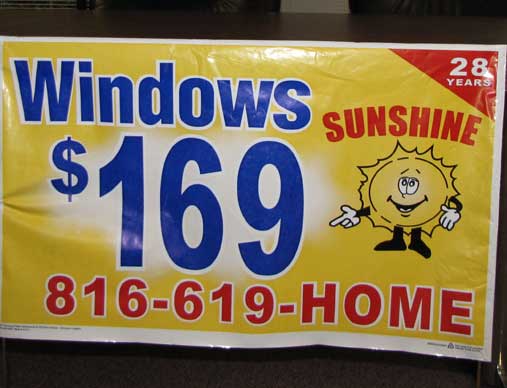
The city says signs like this one are illegal if they are placed in the public right-of-way or on utility poles, yet many companies have been illegally placing signs for years. Kansas City will now be one of the cities like Overland Park where companies know illegal signs will not be tolerated, according to city officials. And a small group of citizens are now “deputized” to find signs and help the city go after offenders.
Several dozen residents of Kansas City showed up last night for training in how to enforce the city’s nuisance sign ordinance. The city began a crackdown on the signs earlier this year after it passed legislation allowing offenders to be fined from $20 to $1000 per sign. And as of last night, citizens who have completed the training are deputized to help the city track down signs and charge repeat offenders with violations.
Basically, the city or any person in Kansas City can take down a nuisance sign, defined as a sign in the right-of-way or on public property. That includes yard sale, real estate, weight loss, “we buy ugly homes” signs, and other types of messages. The exception is political signs, which are allowed from six weeks before to two weeks after an election.
But those trained last night are also encouraged to take additional steps. The city is asking them to take pictures of nuisance signs, gather them up, and take them to the city; then fill out a nuisance sign affidavit which the city can use to fine offenders. Only those who have been trained can use the affidavit.
“Any citizen can pull signs, but to be part of enforcement, you have to go through training,” John Parks, Abatement Services Manager in the Neighborhood and Housing Services Department, said.
The city may hold additional trainings or neighborhoods can request training by contacting Parks.
Parks suggested to neighborhood leaders that they use some discretion in enforcement. People may not be aware that signs for lost pets or garage sales cannot legally be placed on utility poles or on public right-of-way. In those cases, neighborhoods might want to let the offenders know they have violated a city law.
But Parks says for some companies, printing cheap signs and placing them in the public median or on utility poles has long been a form of cheap advertisement. “Before we had the penalty, they just considered it a cost of doing businesses. When all we were doing was taking them down, it wasn’t really hitting them in the pocketbook.”
Since the city doesn’t have the manpower to enforce the ordinance by itself, it hopes citizens will help. Councilman Scott Wagner, who co-sponsored the ordinance, told the trainees, “Now, with your help with enforcement and participation, we can start making a dent.”



Trackbacks